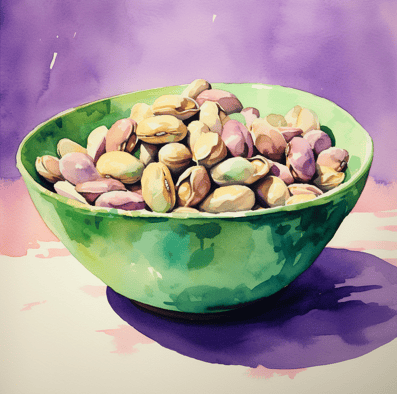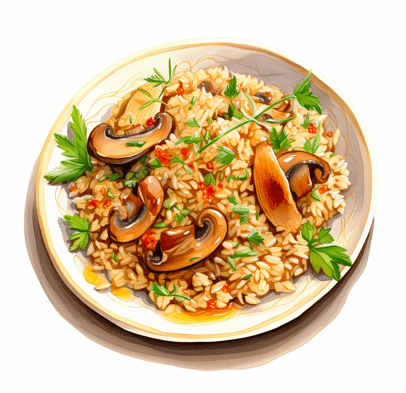
Imagine finding a simple, natural way to manage your PCOS symptoms—yes, it’s possible! By embracing a plant-based diet for PCOS you can tap into a lifestyle that not only aligns with your skincare goals but also boosts your overall health. We will go through the main principles as well as very easy tricks to start with.
Hi, I’m Hazel
I gave up on skincare after years of issues with acne and sensitive skin.
But after going plant-based, my skin cleared up and even started to glow. Now I help women reveal their natural beauty with simple, delicious plant-based food.
I also used to be a nurse, and love nerding out on nutritional science (high-quality science, that is).

As usual, this post is based on the strongest nutritional evidence I could find with a focus on the simplest, most delicious foods
…because who has time to waste on actions that don’t work?
The quick version:
A plant-based diet for PCOS focuses on reducing high-AGE foods like grilled and fried animal products and increasing antioxidant-rich foods such as berries, nuts, and green leafy vegetables. This dietary approach helps manage insulin resistance, balance hormone levels, and support a healthy weight. Incorporating easy-to-find foods like apple cider vinegar, marjoram tea, and spearmint tea can further enhance your PCOS management and overall health.
PCOS and Its Culprits
In order to know what foods to prioritise, we first need to understand how certain foods contribute to polycystic ovarian syndrome (PCOS).
PCOS is a hormonal disorder that affects many women of reproductive age, marked by a variety of symptoms of PCOS such as irregular periods, ovarian cysts, excessive body hair, and challenges with weight management. Central to its development are issues like insulin resistance and hormonal disruptions, which not only impact reproductive health but also a woman’s overall well-being.
A significant factor exacerbating PCOS is the high level of advanced glycation end products (AGEs) in the body.
Research shows that women with PCOS have nearly twice the circulating AGE levels, contributing to increased oxidative stress and inflammation, critical processes in the progression of chronic diseases including PCOS (1, 2, 3).
This heightened level of AGEs can lead to more severe PCOS symptoms, affecting everything from menstrual cycles to glucose metabolism.

The primary sources of AGEs are foods that have been cooked at high temperatures, especially those from animal products like meats cooked through broiling, grilling, frying, or roasting (3).
These cooking methods significantly increase the AGE content of food, which, when consumed, can aggravate insulin resistance, one of the key mechanisms in the development of PCOS.
By understanding these factors, it’s clear that typical western diets contribute greatly to PCOS. The great news about this is that it’s in your power to change your PCOS through a plant-based lifestyle.
Three Dietary Changes to Combat PCOS
Managing PCOS involves understanding and adjusting your intake based on the role AGEs in the condition:
1. Reduce High-AGE Foods
Reducing consumption of foods high in AGEs can help manage hormonal imbalances that lead to irregular periods and ovarian cysts (3).
The first step is moving towards plant-based protein. The second step is knowing that even vegans get more than enough protein from plant-based sources.
Increase Plant-Based Protein
Transitioning to a plant-based diet doesn’t mean you’ll struggle to meet your protein needs. Here are some practical ways to replace animal protein with plant-based alternatives, ensuring you get more than enough protein:

- Incorporate Legumes: Beans, lentils, and chickpeas are excellent sources of protein and are versatile in recipes from salads to soups.
- Use Quinoa and Amaranth: These grains contain all nine essential amino acids, making them complete proteins, ideal for meals.
- Add Nuts and Seeds: Sprinkle almonds, chia seeds, or flaxseeds onto meals for a protein boost.
- Choose High-Protein Vegetables: Incorporate green peas, spinach, and broccoli into your meals for additional protein.
- Explore Soy Products: Tofu, tempeh, and edamame are rich in protein and can replace meat in almost any dish.
These food have the additional beneficial effects of reducing inflammation, supporting skincare and a low GI diet. The fibre in these plant-based proteins also prevent weight gain.
And Don’t Worry, Even Vegans Get Enough Protein
A big concern from meat-eaters is ‘Where will I get enough protein?’.
A large-scale study comparing the nutrient profiles of individuals on various diets—including plant-based diets—has shown that the concern for protein deficiencies in a vegetarian diet or a vegan diet is largely unfounded.
It found that both vegetarians and vegans, on average, consume 70% more protein than the daily requirement of 42 grams (4).
This data conclusively answers the common question about protein sufficiency, demonstrating that people following plant-based diets typically consume significantly more protein than necessary.
You may also like:
Got Protein? Your Hemp vs Whey Protein Guide
2. Eat Foods that Reduce AGEs

Incorporate high-fibre foods like brown rice and such as mushrooms.
These foods are beneficial in drawing out and reducing AGE levels in the body. The reduction in AGEs can diminish the oxidative stress within the ovaries, potentially easing symptoms of PCOS and improving menstrual cycle regularity (5).
3. Increase Antioxidant-Rich Foods
To manage PCOS effectively, boosting your intake of antioxidants can be crucial.
These powerful compounds combat the oxidative stress associated with AGEs. Focusing on a vibrant, antioxidant-rich diet also supports hormone balance and healthy weightand brilliant skincare.

Easy Ways to Increase Antioxidants
- Spice It Up: Spices lead the pack when it comes to antioxidant density. Include a variety of spices like turmeric, cinnamon, and ginger in your meals. These can be added to smoothies, teas, or sprinkled over dishes to enhance flavour while boosting your health.
- Berry Delicious Choices: As the second-highest group for antioxidants, berries such as blueberries, strawberries, and blackberries should be a staple in your diet. Blend them into smoothies, toss them into oatmeal, or simply enjoy a bowl as a fresh, sweet treat.
- Take Some Tea Time: Incorporate antioxidant-rich teas into your daily routine. Green tea is renowned for its high antioxidant content and health benefits. Chai, with its blend of spices like cardamom and cloves, also offers a potent antioxidant kick. Enjoy these teas hot or iced as a refreshing way to stay hydrated and healthy.
- Go for Colour: Choose foods with vibrant colours. Opt for orange sweet potatoes over regular potatoes, and black beans over white. These colourful alternatives are not only higher in antioxidants but also contain more fibre, which is beneficial for managing PCOS.
- Embrace Nutty Flavours: Nuts like almonds and walnuts are excellent sources of antioxidants. They’re perfect for snacking or adding a crunchy texture to salads and breakfast cereals. Their healthy fats also help with satiety, aiding in weight management.
By incorporating these antioxidant-rich foods into your daily diet, you’ll not only enhance the flavours of your meals but also take significant steps toward managing your PCOS symptoms effectively, promoting a balanced hormonal environment and a healthier lifestyle.
The Easiest Foods for PCOS
Are you finding all of this dietary change intimidating? That’s ok! Let’s start with some small diet changes instead.

Here are some of the most effective and easy-to-integrate plant-based foods that could be beneficial in a PCOS diet:
Apple Cider Vinegar
A straightforward remedy for improving insulin resistance, a key issue in PCOS, is incorporating a tablespoon of apple cider vinegar into your daily routine.
A study highlighted that consuming this vinegar daily could help regulate menstrual cycles and improve insulin sensitivity, showing promising results in just a few months. While this doesn’t conclusively prove effectiveness, it’s an inexpensive, low-risk option that may also aid in weight loss and support a healthier lifestyle (6).
Marjoram Tea
Drinking two cups of marjoram tea daily has been shown to positively affect hormonal profiles.
This herb can improve insulin sensitivity and lower adrenal androgens, which are often elevated in PCOS cases. Although the study wasn’t long enough to confirm improvements in symptoms, the initial results suggest potential benefits for those following a PCOS diet (7).
Spearmint Tea
Spearmint tea has demonstrated potential in reducing free and total testosterone levels, crucial for managing PCOS.
Consuming this tea twice a day was found to also increase LH and FSH levels, essential hormones that can help regulate the menstrual cycle and improve ovarian function, making it a valuable addition to the diet (8).
You’ll also love:
Bye-Bye Blemishes: Is Peppermint Tea Good for Acne?
Raw Red Onion
Known for its cholesterol-lowering properties, raw red onion is another easy-to-add ingredient that enhances overall health.
Its potent antioxidant and anti-inflammatory properties can help reduce cardiovascular risks, which are higher in women with PCOS, making it a healthy choice for weight management and overall wellness (9).
Each of these foods not only addresses specific symptoms of PCOS but also contributes to a more balanced and nutritious diet, paving the way for a healthier life.
Plant-based diet for PCOS
Adopting a plant-based diet for PCOS is more than a dietary change; it’s a lifestyle transformation that can significantly improve your weight gain challenges and stabilise your body weight. This approach not only supports the development of PCOS management strategies but also fosters healthier dietary patterns, moving away from the typical Western diets that often exacerbate PCOS symptoms. By making these changes, you’re not just addressing the immediate concerns of polycystic ovary syndrome but also enhancing your overall health and well-being. Embrace this journey with the confidence that a plant-based diet can be your ally in achieving a balanced and vibrant life.
References
Most references below will link to the original peer-reviewed study itself. However, sometimes I will link to a video over at NutritionFacts.org instead, which is by far the single best resource of brutally transparent nutritional evidence you will ever see. Dr Greger tells a great story about the realities of the science and if I think you will benefit more from one of his videos, the link will take you there instead.
Happy nerding!
- Uribarri J, del Castillo MD, de la Maza MP, et al. Dietary advanced glycation end products and their role in health and disease. Adv Nutr. 2015;6(4):461-473. Published 2015 Jul 15. doi:10.3945/an.115.008433
- Diamanti-Kandarakis E, Piperi C, Patsouris E, et al. Immunohistochemical localization of advanced glycation end-products (AGEs) and their receptor (RAGE) in polycystic and normal ovaries. Histochem Cell Biol. 2007;127(6):581-589. doi:10.1007/s00418-006-0265-3
- Diamanti-Kandarakis E, Katsikis I, Piperi C, et al. Increased serum advanced glycation end-products is a distinct finding in lean women with polycystic ovary syndrome (PCOS). Clin Endocrinol (Oxf). 2008;69(4):634-641. doi:10.1111/j.1365-2265.2008.03247.x
- Video: Do Vegans Get Enough Protein? at NutritionFacts.org
- Uribarri J, He JC. The low AGE diet: a neglected aspect of clinical nephrology practice?. Nephron. 2015;130(1):48-53. doi:10.1159/000381315
- Wu D, Kimura F, Takashima A, et al. Intake of vinegar beverage is associated with restoration of ovulatory function in women with polycystic ovary syndrome. Tohoku J Exp Med. 2013;230(1):17-23. doi:10.1620/tjem.230.17
- Haj-Husein I, Tukan S, Alkazaleh F. The effect of marjoram (Origanum majorana) tea on the hormonal profile of women with polycystic ovary syndrome: a randomised controlled pilot study. J Hum Nutr Diet. 2016;29(1):105-111. doi:10.1111/jhn.12290
- Grant P. Spearmint herbal tea has significant anti-androgen effects in polycystic ovarian syndrome. A randomized controlled trial. Phytother Res. 2010;24(2):186-188. doi:10.1002/ptr.2900
- Ebrahimi-Mameghani M, Saghafi-Asl M, Niafar M, Asghari-Jafarabadi M, Mesgari-Abbasi M. Raw red onion intake and insulin resistance markers in overweight or obese patients with polycystic ovary syndrome: a randomized controlled-clinical trial. Prog Nutr. 2018;20(1-S):199-208.